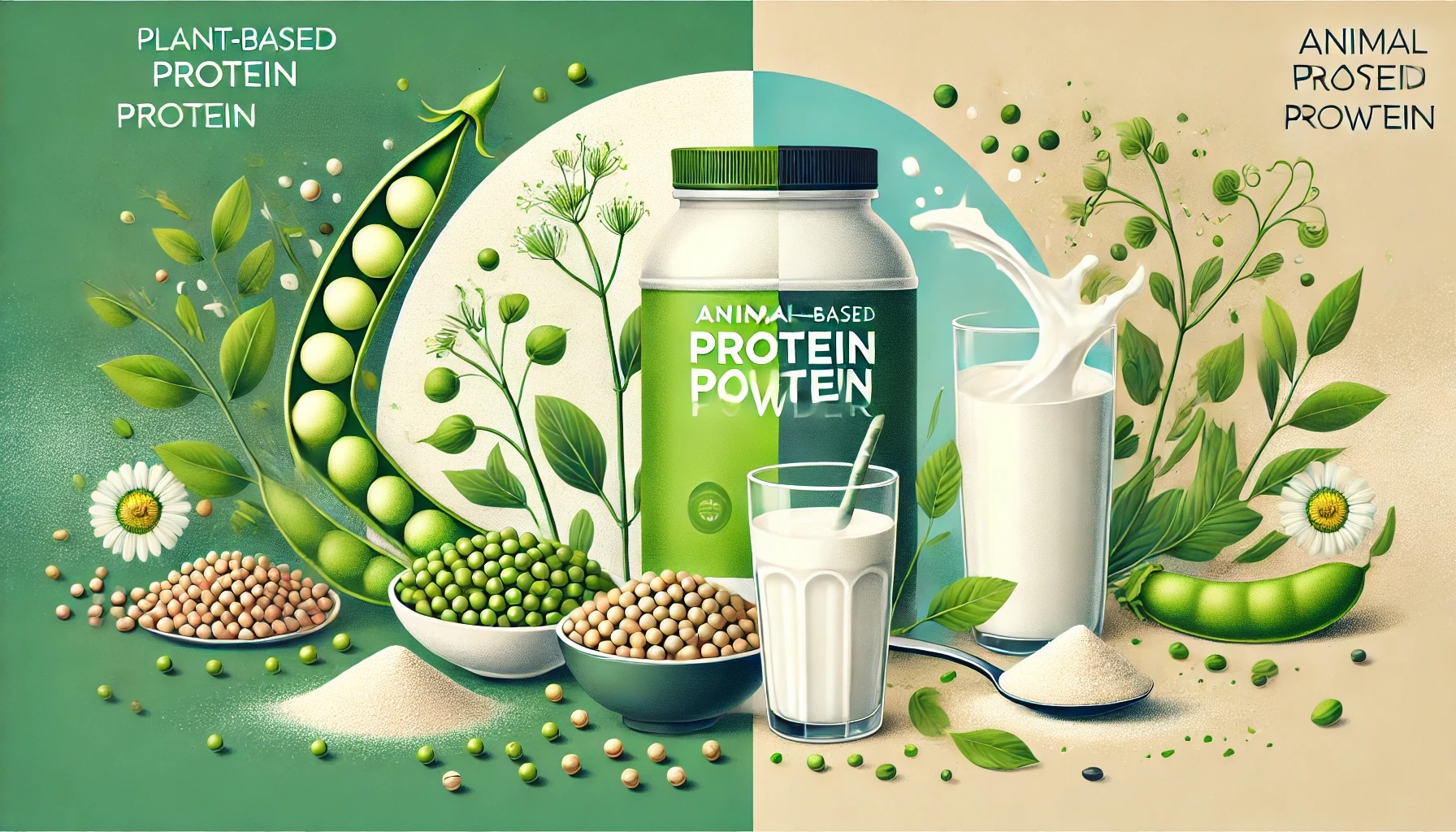Protein is one of the essential nutrients for the human body. It plays a vital role in muscle growth and repair, enzyme production, immune system functioning, hormonal balance, and metabolism regulation. With the rise of health awareness and the popularity of plant-based diets, the protein powder market has seen significant growth. When choosing protein powders, people often face the dilemma: plant-based or animal-based protein powder, which is healthier?
This article delves into the sources, nutritional value, health benefits, environmental impact, and target audience of plant-based and animal-based protein powders to help you make an informed decision.
Sources of Plant-Based and Animal-Based Protein Powders
Plant-based protein powders are derived from plant sources such as peas, rice, soy, pumpkin seeds, and quinoa. Each type has unique characteristics. For example, pea protein is rich in branched-chain amino acids (BCAAs), which aid muscle repair and growth. Rice protein is easy to digest, making it suitable for sensitive stomachs. Quinoa protein, known as a “complete protein,” provides all essential amino acids.
Animal-based protein powders are extracted from dairy, eggs, or meat, including whey protein, casein, egg white protein, and beef protein. Whey protein is popular among fitness enthusiasts due to its rapid absorption and high bioavailability. Casein digests slowly, making it ideal for nighttime supplementation. Egg white protein is lactose-free, catering to those with dairy intolerance, while beef protein offers an alternative for individuals allergic to dairy but seeking high-protein options.
Nutritional Value Comparison
Amino acid composition is a critical indicator of protein quality. Animal-based protein powders contain all essential amino acids in balanced proportions. Their amino acid scores are typically near or at 1.0, indicating “ideal protein.” Whey protein and egg white protein score highest on the Protein Digestibility Corrected Amino Acid Score (PDCAAS), making them excellent for muscle synthesis and repair.
Plant-based protein powders may lack certain essential amino acids. For instance, rice protein is low in lysine, while pea protein has lower methionine levels. However, combining different plant proteins (e.g., pea and rice) can provide a complete amino acid profile comparable to animal-based protein powders.
In terms of digestibility, animal-based protein powders, particularly whey protein, are highly bioavailable and quickly absorbed, making them suitable for post-exercise recovery. While plant-based protein powders may have slightly lower absorption rates, modern processing methods such as fermentation have significantly improved their digestibility.
Plant-based protein powders also offer an edge in micronutrients. Due to the diversity of their sources, they often contain dietary fiber, vitamins, and plant compounds like antioxidants and polyphenols. These components support cardiovascular health and have anti-inflammatory properties. On the other hand, animal-based protein powders are rich in Vitamin B12, calcium, and iron, essential for preventing anemia and maintaining bone health.
Health Benefits Comparison
Plant-based protein powders, with their naturally low cholesterol and saturated fat content, can help reduce the risk of cardiovascular diseases. They also contain dietary fiber and antioxidants, which promote gut health and combat inflammation. Studies suggest that individuals consuming more plant-based proteins have lower rates of chronic diseases such as hypertension and diabetes.
Animal-based protein powders, despite containing some cholesterol, have shown potential to increase “good” HDL cholesterol levels. Their rapid absorption properties make them highly effective for post-workout recovery and muscle growth. However, excessive consumption of certain animal proteins, especially those high in fat, may increase the risk of cardiovascular diseases and obesity.
Both types of protein powders support weight management by enhancing satiety and reducing overall calorie intake. Plant-based protein powders, with their higher fiber content, may provide longer-lasting satiety, making them ideal for weight control. Animal-based protein powders, due to their quick absorption, are better suited for rapid energy replenishment after exercise.
For individuals with allergies or sensitive digestive systems, plant-based protein powders are a safer choice. Many people experience discomfort from lactose in animal-based protein powders, while plant proteins are naturally lactose-free and hypoallergenic.
Sustainability and Environmental Impact
Plant-based protein powders have a clear advantage in terms of environmental sustainability. Producing plant-based proteins typically requires fewer resources, such as land and water, and results in lower greenhouse gas emissions. Crops like peas and soy have a relatively low environmental footprint, making them an eco-friendly choice.
In contrast, the production of animal-based protein powders has a greater environmental impact. Livestock farming consumes significant water and land resources and releases large amounts of methane, a potent greenhouse gas. With growing global concerns about climate change, many individuals are turning to plant-based protein powders to reduce their carbon footprint.
Target Audience and Recommendations
Plant-based protein powders are ideal for vegetarians, vegans, lactose-intolerant individuals, those allergic to dairy, and environmentally conscious consumers. Animal-based protein powders, on the other hand, are better suited for high-intensity athletes or individuals seeking rapid protein replenishment, especially for muscle growth and recovery.
For most general consumers, there’s no need to limit yourself to a single source. Many modern protein powder brands offer blended products that combine the benefits of plant-based and animal-based proteins to meet diverse nutritional needs.
How to Choose the Right Protein Powder?
When choosing a protein powder, consider your dietary preferences (e.g., vegan or non-vegan), health conditions (e.g., lactose intolerance or food allergies), exercise needs (e.g., rapid absorption), and commitment to environmental sustainability. Additionally, taste and texture play an important role, particularly if you plan to use protein powders long-term.
The market offers a wide range of high-quality plant-based and animal-based protein powders. When purchasing, read labels carefully to understand the source, amino acid composition, and additional nutrients to ensure the product aligns with your health goals.
Conclusion: Which Is Healthier?
Plant-based and animal-based protein powders each have their strengths. Their impact on health depends on overall dietary habits, personal needs, and lifestyle choices. If you prioritize cardiovascular health, environmental sustainability, or have dairy allergies, plant-based protein powders are likely the better option. If your goal is rapid protein replenishment or muscle growth, animal-based protein powders may be more suitable.
Ultimately, a balanced and varied diet is key to optimal health. Pairing your protein powder choice with whole foods and an active lifestyle is the best way to achieve long-term health and wellness.




















